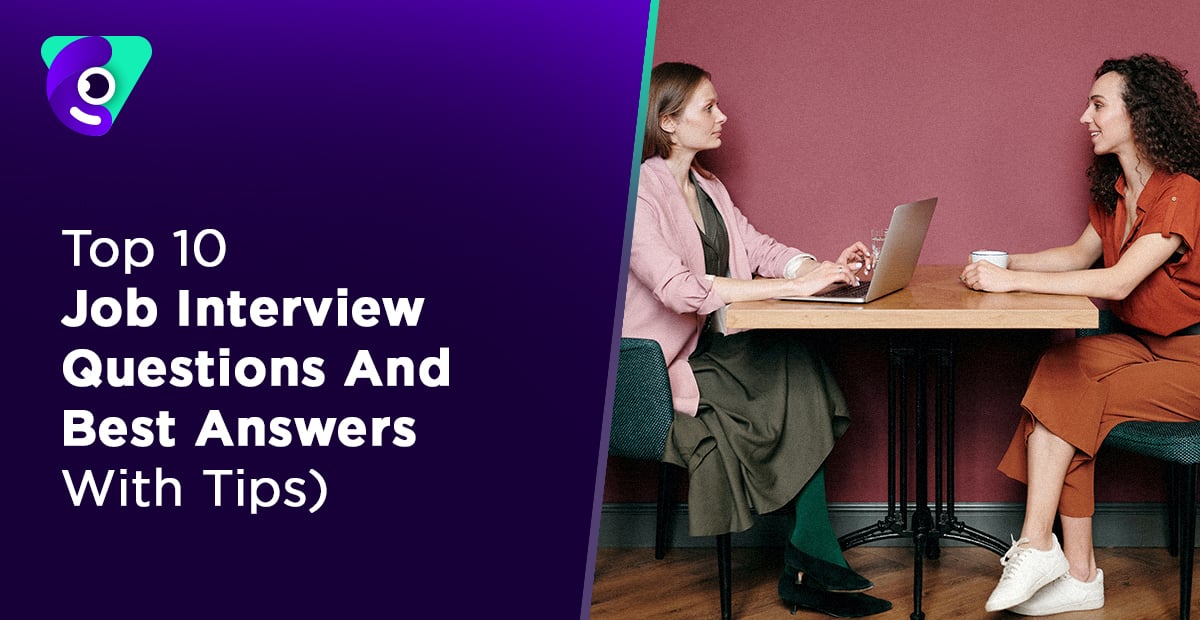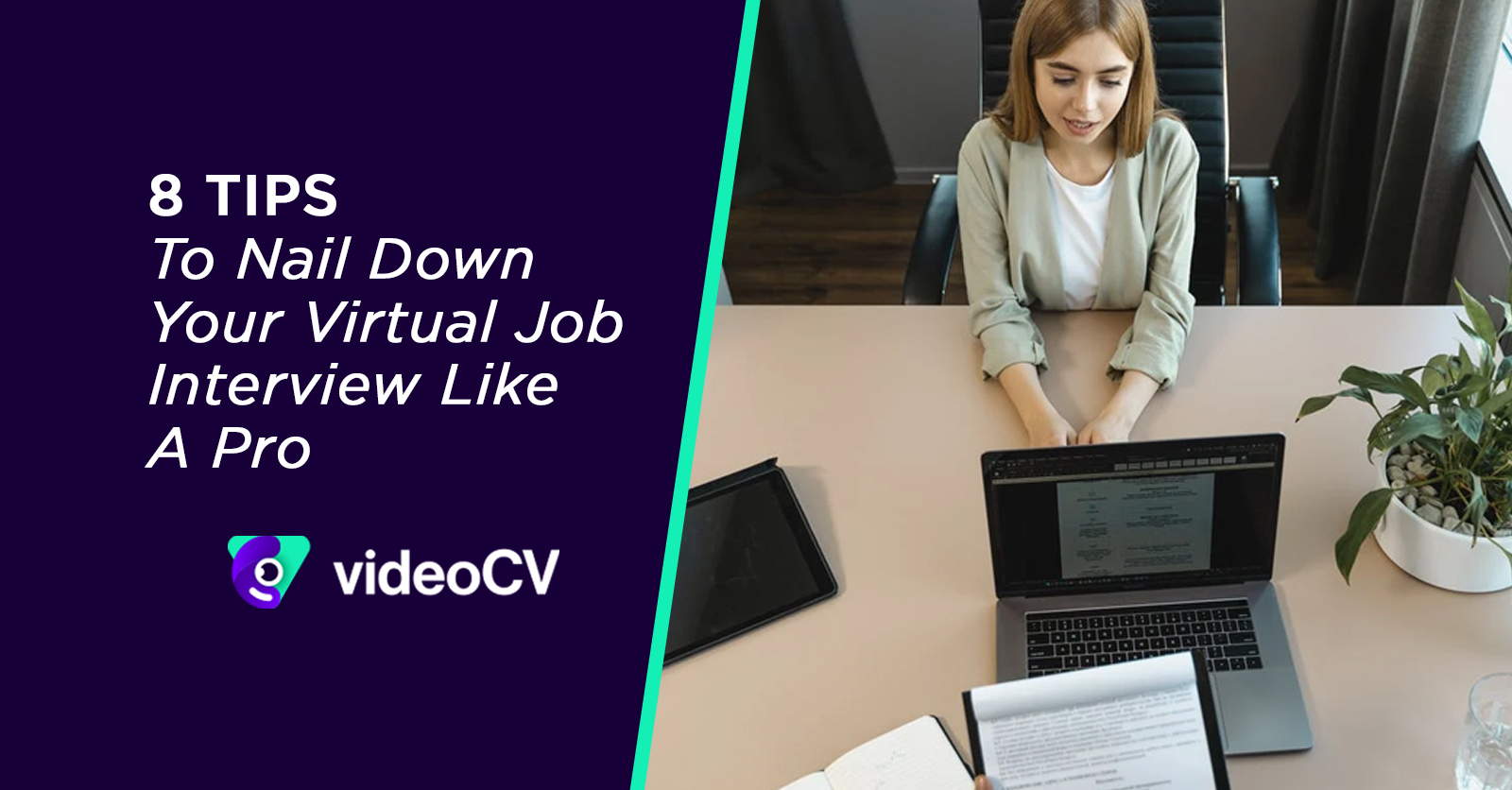Top 10 Job Interview Questions And Best Answers (With Tips)
Mistakes in answering questions can be costly, whether the job you are interviewing for is permanent or temporary. And when you consider only 12% of hiring managers will make a phone call to potential candidates about something that looks odd on a resume, you need to be as prepared as possible for interview questions. The best way to get ready for an interview is to take the time to review the top ten video interview questions (with tips) and make sure you already have answers in mind before you go into the interview.
What if you need to do a video interview?
More and more employers are using video to interview and screen candidates. Video interviewing is a great way to interview candidates before you invite them to an in-person interview. With almost no cost, time spent recruiting candidates can nearly be cut in half. With the right system, you'll be able to create a better-interviewing pool and boost your chances of finding a good hire. Here are the top 10 types of video interview questions to consider.
But before we get to that...
Preparation is key: how to prepare for a video interview
Prepare for the interview, so you can nail the interview!
Nerves are a natural part of the job interview process. But there's no reason to let your fear stop you from shining during a job interview. Preparing for a job interview will help you relax and control any jitters. Before your job interview, spend some time thinking about how you'll answer some of the most common questions. The more thoughtful answers you have for these typical questions, the better prepared you'll be.
Most Common Interview Questions and answers
The number one thing you should do to prepare for an interview is research the job description, company overview, and even your soon-to-be boss. To find out what specific questions to expect at your next interview, see our list of common interview questions along with answers to each question. This way you'll be prepared to give direct answers to the inquiries being asked, which will ultimately lead to a successful interview.
This list will help prepare you for interviews with an edge over other candidates.
1. Let's get personal: Questions about youInterviewers will typically kick things off by trying to get some insights into your character and personality.
What goals have you set for yourself in the next few years? What kind of work environment do you prefer? What would your previous boss think was your greatest asset? Interviewers will be asking questions like these in order to better understand if you're a good fit for the job and the company.
One of the most common personal questions asked is:
“Tell me about yourself” if you’re anything like most of the job seekers out there right now, you’ll probably have to hold back an eye-roll at this question. While “tell us about yourself” may be one of the most cliche questions out there, it is so popular for a pretty good reason. “Tell me about yourself" is a question employers commonly use in the beginning to both get an idea of who you are and determine whether you have the required experience for the job. When this question is asked, your script could be something like "My name is Jill Thomas, and I'm currently seeking a position in sales. I've been working at XYZ Company where I sold products to retail stores all around the country. XYZ was acquired by Acme Company, where I continued to work for 6 months before deciding to pursue other opportunities."
And that’s fine, but...
But if you want an edge over the other candidates, you’re going to have to give the panel a bit more sustenance if you want to be a standout. And besides standing out, it also helps you to expose who you are- and this is especially valuable if you genuinely feel you can grow in your career and benefit the company by landing the role.
To do that, you may have to expand your answers beyond the generic stuff. Sometimes, you’ll find an interviewer that actually asks questions to glean this from you. But, if they don’t- you have to offer them a taste so that they want to keep learning more about you.
Some broad examples are:
- What makes you unique?
- What is your greatest strength?
- How will your greatest strength help you perform?
- What is your greatest weakness?
- How do you deal with failure?
- What are your problem-solving abilities?
- How do you deal with success?
- In what way do you consider yourself successful? And Why?
- Tell us something we should know that's not on your resume.
- Describe yourself to us
- How do you handle the pressure?
- What is your biggest professional accomplishment?
- Describe a typical work week.
- Are you willing to face failure?
- What type of work environments do you thrive in?
Other personal questions you may be asked:
What career goals have you set for yourself in the next few years? Are you on the career path you want to be? What kind of work environment do you prefer? What would your previous boss think was your greatest asset? Interviewers will be asking questions like these in order to better understand if you're a good fit for the job and the company.
2. Questions about Previous EmploymentWhen you apply for a job, one of the first questions you can expect to be asked is why you are looking. Employers will want to know whether now's the right time for you to move on to something new. Knowing how to answer this question thoughtfully and positively with each employer is an important part of finding your next job. It shows that you're not only prepared but also thoughtful; giving reasons along the lines of "I've learned all I can here" or "the company's growth seems stalled" indicate that you researched the company and its direction before applying, which makes you stand out among other candidates
Some common questions in this category are:
- Why are you leaving your current job?
- Why do you want to change jobs?
- Why did you leave your last job?
- What have you been doing since your last job?
Hot tip!
If you're planning to jump ship and leave your current job, remember that an employer doesn't want to hear you're bored or frustrated. They want to know that you've had the foresight and the self-discipline to make a well-considered decision to take another position.
3. Questions asking why you should be hiredSo you want the job. This is your chance to sell yourself to the interviewer by explaining why you're the right person for the job.
Commonly asked questions about why you should be hired:
- Why should we hire you?
- Why shouldn't we hire you?
- What value can you add to this company as an employee?
Hot Tip!
Sell Yourself: During the interview, regardless of what questions you're asked, speak of your strengths and positive attributes. As we all know we often describe ourselves more negatively than positively. So, think about all of your best qualities and why you're a good fit for this position and company and how that makes you a great candidate for this job. You can even refer to your resume and/or research to prepare for this part of the interview.
4. Questions about SalaryThe first question you'll be asked is one of the most straightforward: "What are you looking for?" This is your chance to find out what kinds of packages similar job candidates have received. If the company seems reluctant to reveal salary information, tell them that salary isn't your top priority, that you're more interested in finding the right job.
The most common questions about salary are designed to uncover whether you are willing to play by the employer's rules. If you can demonstrate that you understand what they want without making any unrealistic counteroffers, you'll get the job offer providing they see you as the best fit.
A hiring manager may ask for your salary requirements to help gauge your worth to the company. Before you prepare for the question, research how much the position should pay to ensure you don't price yourself out of the running. When answering this question, avoid any specific numbers and consider stating a salary range or naming a salary comparable to peers in the same field, as opposed to past salaries.
Some common questions about salary include:
- What are your expectations for the salary?
- What are your salary requirements?
And sometimes, depending on the situation, the interview might like to dig a little deeper:
- Why would you take a job for less money?
- What was your starting compensation and final compensation?
Hot tip!
If an interviewer asks you specifics about your previous job salary, it will pay off to be as honest and transparent as possible so that your answers match if cross-referenced.
5. Questions about QualificationsIf you're asked about qualifications for a job, be prepared to explain your education, training, courses are taken, and experience. Use specific examples of how your skills or abilities related to the requirements of the job. Don't make assumptions—use numbers, percentages, statistics, or percentages to emphasize the importance of your accomplishments.
When answering questions about qualifications, be sure to include skills relevant to the position for which you are applying. For example, if you're interviewing for an account manager position, include relevant skills such as public speaking, presentation, and communication. If you're applying for a summer internship, your experience should include things that will help you succeed during an internship. These could include collaboration, time management, and working under pressure. Responses that focus on experiences rather than just skills may indicate deeper knowledge of what is required in the job.
Hot Tip!
Open with a clear statement of your qualifications, relevant skills, and experiences. Conclude with a restatement of why you want this job.
Some questions about your qualifications you can expect:
- Do you have any applicable experience?
- Do you think you are overqualified for this job?
- Did you impact the bottom line at your previous job?
- Does a particular philosophy guide your work?
- Which strength of yours will help you achieve success at this job?
- Tell us about your educational background.
- What makes you stand out from the other candidates?
- What part of the job will be the easiest for you?
- Which parts will be the biggest challenge for you?
After reviewing your cover letter, resume, work history, and other application materials the interviewer is likely to ask you questions designed to see how you handle questions about your past employment.
Your work history should match the expectations of the position you're interviewing for. If it doesn't, expect to explain why you took your sweet time getting your degree after high school, or why you took a couple of years off after college. Or perhaps you were working part-time because you had young children at home. The key is being upfront so there are no surprises later.
Employers often lookout for loyalty- because recruiting new, and ideally near-perfect, employees can drain resources. So, questions often have an angle on discovering your loyalty to past positions. Stability in your work history is an indicator of investment in the company.
Hot Tip!
If asked about gaps in your work history, including reasons for them or job dissatisfaction, are you able to talk about the positive steps you are taking to overcome them?
Common questions to expect about your work history:
- What were your expectations for the job and have they met?
- What did your responsibilities entail?
- What major challenges and problems did you face? How did you handle them?
- Have you learned from your mistakes?
- What happened in the gap in your employment history?
- What did you like about your previous job? What did you dislike?
- Which was most rewarding? And what was the least?
- What was the biggest accomplishment in your previous job?
What kind of performance reviews have you received? What did you do exceptionally well? What were your shortcomings? Human resources recruiters and hiring managers want to know the answers to these questions. A good way to prepare for this is to think about your performance in previous jobs/roles, especially jobs/roles that are similar to the one you're applying for.
Your interviewer needs to see how you performed in previous roles, so you should be ready to answer questions about what you did well - and what challenges you faced. Knowing the common types of questions that are asked helps to prepare yourself for the job interview because it gives you strategies for answering difficult questions or ones that are unexpected.
Hot Tip!
For each job-related performance question, match—or provide—the relevant experience that will convince the employer that your past performance is relevant to their needs. Make sure to tailor your answers to emphasize your greatest strengths.
Popular job performance questions are:
- Tell us about something you think you would like to do differently at your previous position if you could
- Do you receive criticism well? What do you generally get criticized about?
- What problems did you encounter in your previous occupation?
- Did you receive the promotions you wanted in your previous jobs?
- If previous coworkers who know you were asked why you should be hired, what would they say?
- What do you think previous coworkers would say when asked to give their opinion on why you were hired for a new position?
- What type of work environment do you enjoy working in?
- How do you define success?
- What motivational strategies would you use for your team?
- What makes you tick?
- Describe a challenging situation at work. How did you overcome it?
Hot Tip 2!
In today's super-competitive world it is crucial to be ready to answer tough interview questions. These tough interviewing questions can often feel negative at first. However, it is essential that you respond in a manner that spins a positive twist on it. Negative questions can be a tricky business. Before you respond, make sure to first analyze the question. Sometimes it holds a positive message but is just worded poorly. Other times it paints a negative picture of past performance which can't be ignored. Reframe the sticky questions into a positive response that fosters learning and growth.
8. Questions about TeamworkManagement and teamwork questions focus on your interaction with fellow workers. Do you work well in a team or do you prefer working on your own? How do you get along with co-workers, managers, and customers? These are all questions potential employers want to know about you.
Teamwork is essential to the success of any business. While you may excel at individual tasks, can you work well with others?
Here are some of the most important team-related questions employers ask.
- Describe your ideal boss.
- Describe the best boss you’ve had and the worst
- How would you handle it if your boss was wrong about something?
- What type of team environment do you like working in?
- How do you define teamwork?
- Have you ever had extreme challenges working with superiors?
- What type of support do you expect from supervisors?
Hot Tip!
Employers ask these questions because team players are productive employees who are focused on the company's success. These are also people who are more likely to submit constructive comments about ways to improve operations for other team members, the workplace, or the company as a whole. What do you think employers are asking you to prove they can trust you?
9. Questions about the New Job & Business/ Company/Work EnvironmentThe more you know about a potential employer, the better your chance of landing a job. Interviewees are often presented with the opportunity to ask questions about the company and the role they will be filling.
- While researching the company, focus on:
- Learning about their history and mission
- Examining their financial statements and competitive position within the industry in which they operate
- Trying to determine how your previous work experience is a good fit for this opportunity, and reviewing any articles written in national publications about them.
Researching the company is a great way to get information about your potential employer. If you know about the company before your interview, it will be easier to ask informed questions and make a more positive impression of yourself and your interest in the position.
These are common interview questions you can expect:
- What interests you most about this job?
- What do you know about this company and what else would you like to know?
- What type of challenges are you looking for in a new job?
- Are you willing to travel for work?
- What is good customer service?
- When could you start at the new position?
- What would be your ideal company culture?
- Why do you want this position?
- Why do you want to work here?
Agreeing to a job is much more than just signing a contract—it's agreeing to stick around for the long haul. Well, that is how employers may see it. If they are looking to add someone to their team for the long haul, then knowing your future intentions will be pivotal for them.
These types of interview questions are used to gauge your commitment level to the company and new position:
- What are you looking for in your next job? What is important to you?
- What is your plan for your career path?
- Where do you see yourself five years from now?
- How do you plan to achieve your career goals?
- How do you envision your career at [this company]?
Hot Tip!
Get ready, you may be faced with the nemesis of questions: Where do you see yourself in 5 years?”
You'll need to come up with a succinct answer to the age-old interview question, "Where do you see yourself in five or ten years?" Employers are interested in long-term plans for you, so have some plans - or at least a planned response- at the ready.
Interviewing for a new job can be an enjoyable, yet somewhat daunting experience. But as you prepare for the interview, keep in mind that your interaction with an employer is a two-way street. They're assessing if you're a good fit for their company just as much as you're assessing if it's a good fit for you. Knowing how to answer interview questions is a powerful preparation technique to landing the role you want.





